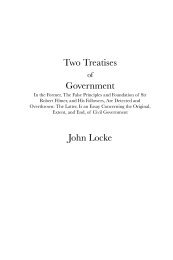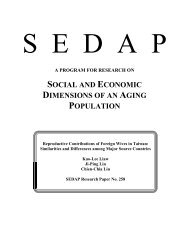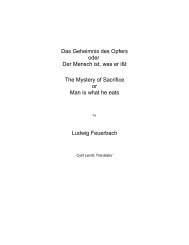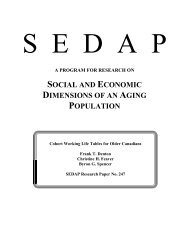AGRICULTUREExcept in exeptional circumstances his wife's earningswould not amount to more than IS. a week and hermeat and drink. The more young children there were,the less <strong>of</strong>ten could the wife work for wages, and whennot doing so her food as well as the chidren's must bepaid for out <strong>of</strong> the family income.In a family with three small children it is unlikelythat the mother's earnings were more than whatwould balance days lost by the father for holidaysor illness, and the cost <strong>of</strong> his food on Sundays, butallowing for a small margin we may assume that 3s. 6d.was the weekly income <strong>of</strong> a labourer's family, and thatthis sum must provide rent and clothing for the wholefamily and food for the mother and children.A careful investigation <strong>of</strong> the cost <strong>of</strong> living isnecessary before we can test-whether this amount wasadequate for the familv's maintenance.There is no reason to suppose that a diet inferiorto present standards could maintain efficiency in the<strong>seventeenth</strong> <strong>century</strong>. On the contrary, the Englishrace at that time attributed their alleged superiorityover other nations to a higher standard <strong>of</strong> living.''The dietary in charitable institutions gives an idea <strong>of</strong> what was considered barenecessity.(Children's Diet in Chrzst Church Hosprtal, 1704.)For breakfast, Bread and Beer. For dinner, Sunday, Tuesday, and Thursday,boiled beef and pottage Monday, mllk pottage, Wednesday, furmity. Fridayold pease & pottage. Saturday water gruel. For supper bread and cheese orbutter for those that cannot eat cheese. Sunday supper, legs <strong>of</strong> mutton. Wednesdayand Friday, pudding pies.(Stow, London, Book I, p. 182.)Dzet for Workhouse, Bashops~ote Street, London.They have Breakfaets, dinners, and suppers every day in the week. For each mea4 OZ. bread, I$ oz. cheese, I oz. butter, I pint <strong>of</strong> beer. Breakfast, four days, breadand cheese or butter and beer. Mondays a pint <strong>of</strong> Pease Pottage, with Bread and Beer.Tuesdays a Plumb Pudding Pye 9 oz. and beer. Wednesdays a pint <strong>of</strong> Furmity.On Friday a pint <strong>of</strong> Barley Broth and bread. On Saturdays, a plaln Flower SewetDumpling with Beer. Their supper always the same, 4 oz. bread,^) <strong>of</strong> cheese or I oz.<strong>of</strong> butter, and beer sufficient. (Stow, London, Bock I, p. 199).Lady Grzsell Bazllae gives her s~rzlant's dzet :Sunday they have bolld beef and broth made in the great pot, and ~lways the brothmade to serve two days. Monday, broth made on Sunday, and a Herring. Tuesday,broth and beef. Wednesday, broth and two eggs each. Thursday, broth and beef.Friday, Broth and herring. Saturday, broth without meat, and cheese, or a puddenA comparison between the purchasing power <strong>of</strong>money in the <strong>seventeenth</strong> and twentieth centuries isunsatisfactory for our purpose, because the relativevalues <strong>of</strong> goods have changed so enormously. Thus,though rent, furniture and clothes were much cheaperin the <strong>seventeenth</strong> <strong>century</strong>, there was less difference inthe price <strong>of</strong> food. Sixpence per day is <strong>of</strong>ten givenin Assessments as the cost <strong>of</strong> a labourer's meatand drink and this is not much below the amountspent per head on these items in wage-earners'families during the first decade <strong>of</strong> the twentieth<strong>century</strong>.One fact alone is almost sufficient to prove theinadequacy <strong>of</strong> a labourer's wage for the maintenance<strong>of</strong> his family. His money wages seldom exceeded theestimated cost <strong>of</strong> his own meat and drink as suppliedby the farmer, and yet these wages were to supplyall the necessaries <strong>of</strong> <strong>life</strong> for his whole family. Someidea <strong>of</strong> the bare cost <strong>of</strong> living in a humble householdmay be gained by the rates fixed for pensions and byallowances made for Poor Relief. From these itappears that four shillings to five shillings a week wasconsidered necessary for an adult's maintenance.The Cromwell family paid four shillings weekly " tothe widd. Bottom for her bord."' Pensions formaimed soldiers and widows were fixed at four shillingsper week " or else work to be provided which willmake their income up to 4s. per week. Sick andwounded soldiers under cure for their wounds tohave 4s. 8d per week.""or blood-~udenr, or a hagish, or what is most convenient. Breakfast and super, haan oatloaf ora proportion <strong>of</strong> broun bread, but better set down the loaf, and seenon is taken or wasted, and a muchkin <strong>of</strong> beer ormilk whenever there is any. Atdinner a mutchkin <strong>of</strong> beer for each. Barllie (Lady Grtsell). Housebold BookPp. 277-8. 1743.Cromwell Family, Bills and Receipts, Vol. II., p. 233, 1635.' Acts and Ordinances <strong>of</strong> the Interregnum, II., p. 556. (For Maimed Soldiers andwidows <strong>of</strong> Scotland and Ireland, Sept 30, 1651.
AGRICULTUREThe Justices in the North Riding <strong>of</strong> Yorkshire drewup a scale <strong>of</strong> reasonable prices for billeted soldiers bywhich each trooper was to pay for his own meat foreach nightdd ; dragoon, 4fd ; foot soldier, 4d.l" Edward Malin, blacksmith, now fourscoreand three past and his wife fourscore, wanting aquarter " very poor and unable " to gett anythingwhereby to live," complained to the HertfordshireQuarter Sessions that they receive only IS. 6d. a weekbetween them ; " others have eighteen pence apiecesingle persons " and desire that an order be made forthem to have 3s. together which is but the allowancemade to other per~ons.~In cases <strong>of</strong> Poor Relief where payments weregenerally intended to be supplementary to othersources <strong>of</strong> income, the grants to widows towards themaintenance <strong>of</strong> their children were <strong>of</strong>ten absurdlysmall ; In Yorkshire, Parish <strong>of</strong>ficers were orderedto " pro~ride convenient habitation for a poorwoman as they shall think fit and pay her +d.weekly for the maintenance <strong>of</strong> herself and child."'In another case to pay a very poor widow 6d. weeklyfor the maintenance <strong>of</strong> herself and her three children.'The allowance<strong>of</strong> 12d. weekly to a woman and hersmall children was reduced to 6d., " because thesaid woman is <strong>of</strong> able body, and other <strong>of</strong> her children areable to work."j On the other hand when an orphanchild was given to strangers to bring up, amountsvarying from IS. to ss. per week were paid for itsmaintenance.'Torks. North Riding, Q. S. Rec., Vol. VII., p. 106, 1690.' Hertfordshire, Co. Rec., Vol. I., p. 258, 1675.Torks. N.R. Q.S. Rcc., Vol. VI., p. 242, 1675.' Ibid, p. z I 7, I 674.Ibid, p. 260, 1674Joane Weekes . . . " hadd a maide childc placed to her to bee kept kbrought upp, the mother <strong>of</strong> which Childe was executed at the Assizes. six ~ounds perann, proporconed toyard the keepinge <strong>of</strong> the said childe . . . besides sheAGRICULTUREThus the amount paid by the Justices for maintainingone pauper child sometimes exceeded thetotal earnings <strong>of</strong> a labourer and his wife. Otherpauper children were maintained in institutions.The girls at a particularly successful Industrial <strong>School</strong>in Bristol were given an excellent and abundant diet- --- -----desireth some allowance extraordinary for bringinge the said Childe to bee fitt togett her livinge." (Somerset, Q.S. Rec., Vol. 111, p. 28-9, 1647).IE 1663 a woman who was committed to the Castle <strong>of</strong> Yorke forfelony and afterwardsexecuted, was while there delivered <strong>of</strong> a male child, which was left in the gaol,and as it was not known where the woman was last an inhabitant the child couldnot be sent to the place <strong>of</strong> her settlement, Sir Tho. Gower was desired by Justices<strong>of</strong> Assize to take a course for present maintenance <strong>of</strong> the child. He caused it to beput unto the wife <strong>of</strong> John Boswell to be nursed and provlded for with other necessarier.John Boswell and h8 wife have maintained the child ever since and have hithertoreceived no manner <strong>of</strong> allowance for the same. Ordered that the several Ridingshall pay their proportions to the maintenance past and present, after the rae <strong>of</strong>L5 per annum. (Torks. N.R. Q.S.Rec., Vol. VI, pp. 102-7. 1666.)... -,Mamaduke Vye was only to have a year for keeping the child bornin the gaol<strong>of</strong> Ivelchester whose mother was hanged for cutting <strong>of</strong> purses. (Somerset Q.S. Rec.,Vol. I, p. IOI., 1617.)-,Item payd to the said widowe Elkyns for Dyett and keeping <strong>of</strong> a poore child leafteupon the chardge <strong>of</strong> the parish at I rd. the weecke from the 14th <strong>of</strong> August, 1599, tillthis secound <strong>of</strong> Sept., 1601, every Saturday, being two yeres and three weeckes,videlicet IT weecker in toto v') vijs. (Ch. Accs., St. Mzcbael's in Bedwendine, WW-CtStel, p. 147.)Itm pd. to Batrome's wife <strong>of</strong> Linstead for keeping <strong>of</strong> Wright's child 52 weeksE3. OS. 8d. (Cratfield Parish Papers, p. 129, 1602.)Pd to Geo. Cole to take and bring up Eliz. Wright, the daughter <strong>of</strong> Ann Wrightaccording to his bond, Aq. oa. od. More towards her apparel1 ss.(I bzd, p. 137. 1609.)Item paide Chart's Child's keeping by the week L+. I IS. 8d. Item for apparrellEr. 18s. 2d. Item paid to the surgeon for her. 3s. 6d.(Suss. Arch. Coll., Vol. xx., p. 101, Acct. Bk <strong>of</strong>Cou,den. 1627.)for apparrelling Wm: Uridge and for his keeping this yeare L5. 12s. gd.(1 bid, p. 103, 1632.)For the keep <strong>of</strong> William Kemsing 14 weeks LI. 2s.8d and 23 weeks at 2s perweek, Lz. 6s. od. and for apparrelling <strong>of</strong> him; and for his indenture8 ; and formoney given with him to put him out apprentice ; and expended in i lacing h outL1 I. 17s. gd.(Ibid, p. 107, 1650.)John Mercies wief for keeping Buckles child, weekly, IS. 6d.John Albaes wief for keeping Partickes childIs. 4d.(S.P.D. cccxlvii, 67, I. Feb, 1637. Answer <strong>of</strong> Churchwardens to Articles givenby J.P's for St. Albans).George Arnold and Jas. ~ichell late overseers <strong>of</strong> the poore <strong>of</strong> the ~arishe <strong>of</strong> Othery. . had committed a poore child to the custody, kee~inge and maintenance <strong>of</strong>. . Robert Harris promising him xijd. weekly. (Somersest, Q.S. Rec., Vol. 111,P 1, 1646.) Order for Thos. Scott, a poor, lame, impotent child, to be placed withJoanna Brandon, She to be paid 5s. a week for his maintenance. (Middlesex Co.p. 180, Srss. Book, 1698).
- Page 1 and 2: WORKING LIFE OF WOMENIN THESEVENTEE
- Page 3 and 4: PREFACEboth can be studied in the w
- Page 5 and 6: 2 INTRODUCTORY INTRODUCTORY 3is det
- Page 7 and 8: INTRODUCTORYThese circumstances hav
- Page 9 and 10: 10 INTRODUCTORY INTRODUCTORYthis pe
- Page 11 and 12: CAPITALISTSTerm includes aristocrac
- Page 13 and 14: CAPITALISTSA granddaughter of Olive
- Page 15 and 16: CAPITALISTSsuch as noe way entangle
- Page 17 and 18: 26 CAPITALISTS CAPITALISTS 27Wellin
- Page 19 and 20: 30 CAPITALISTS CAPITALISTS 3'years
- Page 21 and 22: CAPITALISTSboth, so that there coul
- Page 23 and 24: 38 CAPITALISTShis Lady was taking d
- Page 25 and 26: AGRICULTURE 43AGRICULTUREAgricultur
- Page 27 and 28: AGRICULTURE AGRICULTURE 47two Weeks
- Page 29 and 30: AGRICULTUREFitzherbert's descriptio
- Page 31 and 32: 54 AGRICULTUREamong the gentry. The
- Page 33 and 34: 5 8 AGRICULTURE AGRICULTURE 59was u
- Page 35 and 36: 62 AGRICULTURE AGRICULTURE 63" Spre
- Page 37: AGRICULTUREthe same work,' a marrie
- Page 41 and 42: AGRICULTUREIn some places the labou
- Page 43 and 44: AGRICULTURELabourers naturally were
- Page 45 and 46: 82 AGRICULTURE AGRICULTUREdenyed a
- Page 47 and 48: AGRICULTUREpayne of xs a weeke and
- Page 49 and 50: AGRICULTUREThe conduct of the magis
- Page 51 and 52: 94 TEXTILES TEXTILESIt requires som
- Page 53 and 54: TEXTILESchildren were said to be em
- Page 55 and 56: TEXTILES TEXTILES 103respect obtain
- Page 57 and 58: TEXTILES TEXTILES'07people who had
- Page 59 and 60: I 10 TEXTILES TEXTILES I111693 to p
- Page 61 and 62: I 14 TEXTILES TEXTILES 115books,' b
- Page 63 and 64: 118 TEXTILES TEXTILES 119money in p
- Page 65 and 66: 122 TEXTILES TEXTILES 123clothing w
- Page 67 and 68: 126 TEXTILES TEXTILESclosely imitat
- Page 69 and 70: 1 30TEXTILESspinsters' maximum wage
- Page 71 and 72: TEXTILESa mownte in the yere t o jM
- Page 73 and 74: '38 TEXTILES TEXTILESD. Silk, and G
- Page 75 and 76: 142TEXTILES TEXTILES '43end. And it
- Page 77 and 78: TEXTILESbranches of the woollen ind
- Page 79 and 80: CRAFTS AND TRADESCHAPTER V.--CRAFTS
- Page 81 and 82: CRAFTS AND TRADES CRAFTS AND TRADES
- Page 83 and 84: I 58CRAFTS AND TRADESwith the wife
- Page 85 and 86: CRAFTS AND TRADES CRAFTS AND TRADES
- Page 87 and 88: CRAFTS AND TRADES. . . . shall teac
- Page 89 and 90:
I 70 CRAFTS AND TRADES CRAFTS AND T
- Page 91 and 92:
CRAFTS AND TRADESone month the Mast
- Page 93 and 94:
178 CRAFTS AND TRADES CRAFTS AND TR
- Page 95 and 96:
182 CRAFTS AND TRADES CRAFTS AND TR
- Page 98 and 99:
I 88 CRAFTS AND TRADES CRAFTS AND T
- Page 100 and 101:
192 CRAFTS AND TRADESIn the unprote
- Page 102 and 103:
CRAFTS AND TRADESand eleven sisters
- Page 104 and 105:
200 CRAFTS AND TRADES CRAFTS AND TR
- Page 106 and 107:
CRAFTS AND TRADES CRAFTS AND TRADES
- Page 108 and 109:
CRAFTS AND TRADESBut if a woman be
- Page 110:
2 12 CRAFTS AND TRADES CRAFTS AND T
- Page 114 and 115:
CRAFTS AND TRADES CRAFTS AND TRADES
- Page 116 and 117:
CRAFTS AND TRADESalso defended as a
- Page 120 and 121:
CRAFTS AND TRADESfrom her fellow pa
- Page 122 and 123:
PROFESSIONS 237PROFESSIONSIntroduct
- Page 124 and 125:
24O PROFESSIONS PROFESSIONStheir Th
- Page 126 and 127:
244 PROFESSIONS PROFESSIONS 245the
- Page 128 and 129:
PROFESSIONS PROFESSIONS 249profanat
- Page 130 and 131:
252PROFESSIONSGiles Moore enters in
- Page 132 and 133:
PROFESSIONScribed as one who " dist
- Page 134 and 135:
PROFESSIONS PROFESSIONS 261first ma
- Page 136 and 137:
264 PROFESSIONSGarrett's leg shall
- Page 138 and 139:
268 PROFESSIONSwhere there are none
- Page 140 and 141:
PROFESSIONS PROFESSIONS 273the numb
- Page 142 and 143:
PROFESSIONSexaminations, before six
- Page 144 and 145:
PROFESSIONS PROFESSIONS 281death me
- Page 146 and 147:
284 PROFESSIONS PROFESSIONSof confi
- Page 148 and 149:
288 PROFESSIONSextent they were whe
- Page 150 and 151:
CONCLUSIONor in her other facilitie
- Page 152 and 153:
CONCLUSION CONCLUSION 297in women's
- Page 154 and 155:
CONCLUSIONlaw of Nature, inviolable
- Page 156 and 157:
CONCLUSIONwere specially deprecated
- Page 158 and 159:
308 CONCLUSIONof the State, and the
- Page 160 and 161:
312 AUTHORITIES AUTHORITIES 313Cost
- Page 162 and 163:
AUTHORITIESMartindale, Adam, The Li
- Page 164 and 165:
County.Buckingham ..Cardigan .. ..C
- Page 166 and 167:
INDEXINDEXFlax, 64, 146, 246, 291 ;
- Page 168:
INDEXsmants, women( 50,65,157 ; mam








